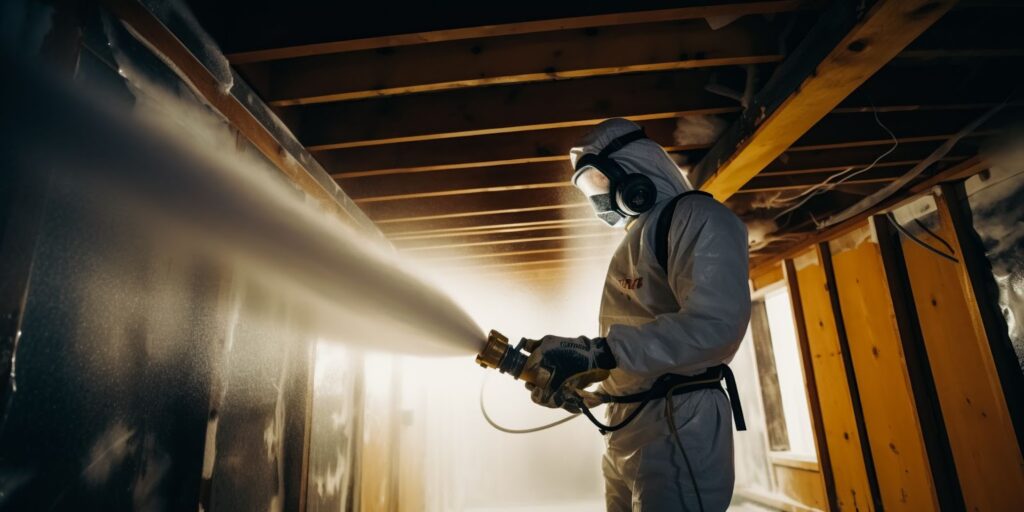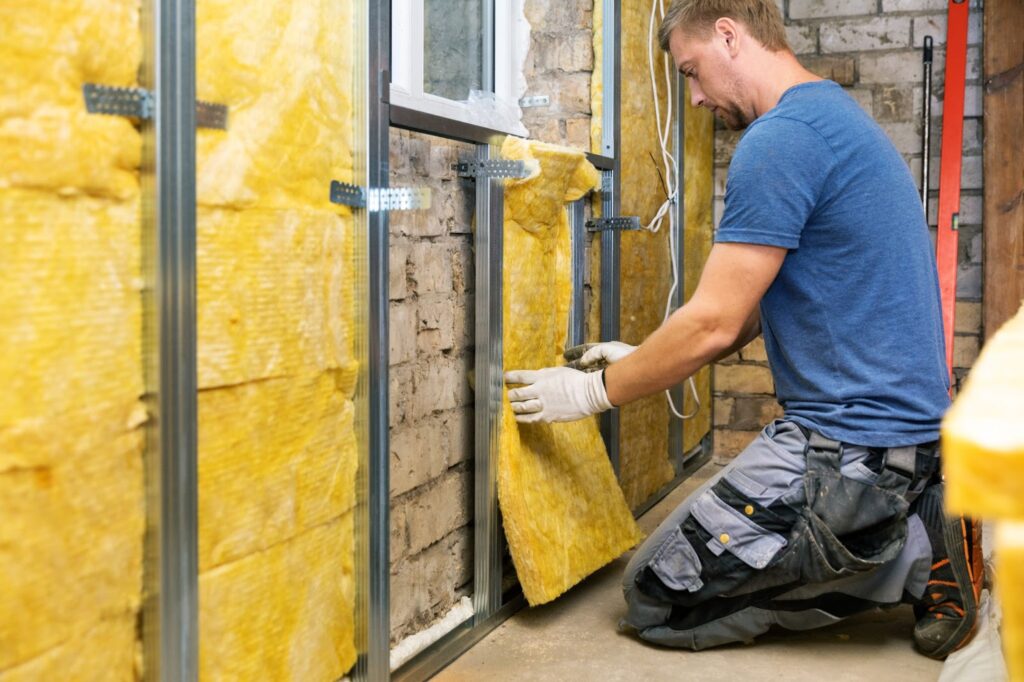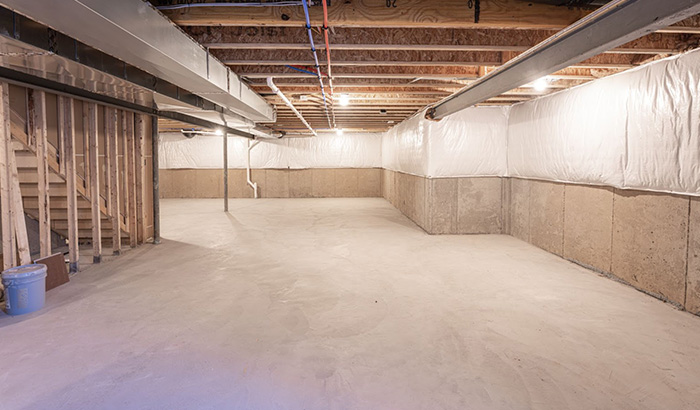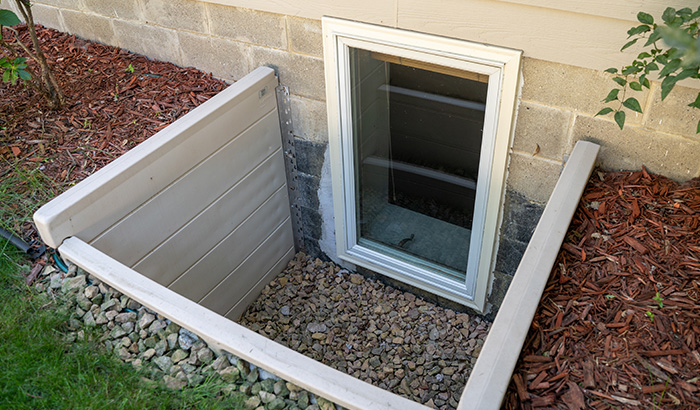Insulating your basement is an investment in energy efficiency, cost savings, and comfort. A well-insulated basement is a barrier against the cold, keeping your home warmer in the winter and cooler in the summer. This makes your living space more comfortable and reduces the demand on your heating and cooling systems, leading to lower energy bills.
Proper basement insulation is magical because it minimizes heat loss. Basements are notorious for being the weak link in a home’s thermal envelope, where heat escapes and cold air infiltrates.
By insulating your basement, you’re essentially putting a cap on this heat loss, which translates to significant energy savings over time. These savings are not simply pennies and dimes; they add up to substantial amounts, making the upfront cost of insulation a wise long-term investment.
Insulation is critical in preventing moisture build-up and the subsequent mold and mildew issues plaguing basements. This protects your home’s structural integrity and ensures a healthier living environment.
As we dive deeper, we’ll explore the strategies and benefits of insulating your basement, guiding you toward making an informed decision that pays off in comfort and savings.
Assess your current insulation
Upgrading your basement insulation begins with a detailed examination of what you currently have in place. This initial step is crucial for pinpointing areas that need improvement and ensuring your efforts yield maximum benefits in terms of energy efficiency and cost savings.
Conduct a visual inspection
Carefully inspect every part of your basement’s existing insulation. Look for signs of wear and tear, such as areas where the insulation has become thin, compressed, or is visibly deteriorating. These signs often indicate that the insulation is no longer performing optimally and needs replacement or supplementation.
Focus on vulnerable areas
Corners and edges are notorious for being overlooked during initial insulation installation, making them prime candidates for heat loss. These areas may have gaps or may not be covered as thoroughly as the rest of your basement, allowing precious heat to escape and cold air to infiltrate.
Detecting hidden gaps
While some insulation deficiencies are visible to the naked eye, others might be less apparent. Use an infrared thermometer to reveal temperature differences in your walls and floors, highlighting areas where insulation may be lacking or absent. These tools are invaluable for identifying spots where cold air is seeping in, or where heat is being lost.
Seek expert guidance
If you’re unsure about your ability to assess your insulation’s effectiveness fully, it’s wise to enlist the help of a professional. An energy auditor or insulation expert will conduct a comprehensive evaluation, using specialized equipment to detect even the most elusive gaps. They will provide you with a detailed analysis of your insulation’s current state and tailored recommendations for improvement.
Identifying and addressing areas of concern ensures that your insulation efforts are as impactful as possible, paving the way for a warmer, more comfortable home and significant savings on your energy bills.
Choose the right insulation material
When insulating your basement, selecting the appropriate material is critical for achieving optimal energy efficiency, moisture control, and cost-effectiveness. Given their unique environmental challenges, basements require insulation that can withstand potential dampness and provide substantial thermal resistance.
Understanding R-values
The R-value of insulation material indicates its ability to resist heat flow. Higher R-values mean better insulation and more significant energy savings. Basements, being more susceptible to heat loss, benefit from materials with higher R-values to keep the space warm and reduce heating costs.
Moisture resistance is key
Basements are often damp places, and selecting insulation that absorbs moisture leads to mold and mildew problems. Materials like closed-cell spray foam insulation are impermeable to water, making them ideal for basement conditions. This type of insulation resists moisture and adds structural strength to your walls.
Cost considerations
While the initial investment in high-quality insulation might seem steep, it’s essential to consider the long-term savings on energy bills. Although more expensive upfront than some alternatives, closed-cell spray foam provides excellent insulation and moisture resistance, potentially saving you more money in the long run.
Closed-cell spray foam advantages
Closed-cell spray foam stands out as a superior basement choice for several reasons. Its high R-value means it insulates better per inch than most other materials, making it highly efficient in keeping your basement warm. Its moisture resistance protects your home from water damage and mold growth, crucial in a basement environment.
Additionally, its ability to expand and fill gaps and cracks upon application ensures a tight seal, further enhancing its insulative properties and making it an effective air barrier.

Seal air leaks
Air leaks are one of the most significant culprits in energy loss, especially in basements where windows, doors, and utility penetrations provide ample opportunities for warm air to escape and cold air to enter. Effectively sealing these leaks is pivotal in bolstering your insulation efforts and creating an energy-efficient home environment.
Identifying air leaks
Begin by thoroughly inspecting your basement to locate potential air leaks. Common areas include window and door frames, where utilities (like pipes and wires) enter your home, and any visible cracks or openings in the walls or floors. Use a smoke stick or incense to see where air might be moving.
Choosing the right sealant
Once you’ve identified the air leaks, selecting the appropriate sealant is crucial. For smaller gaps (less than a quarter inch), caulk is an excellent option. It’s easy to apply and flexes with the building materials to prevent future cracks.
Expandable foam sealant provides a more robust solution for larger gaps or openings. It expands to fill the space and then hardens, creating a solid barrier against air leakage.
Applying sealant properly
When sealing gaps, cleanliness and preparation are key. Ensure the area around the leak is clean and dry before applying caulk or foam. When using caulk, cut the tip of the tube to match the size of the gap you’re sealing, and apply it in a smooth, continuous line. For expandable foam, a little goes a long way; apply it sparingly, as it will expand to fill the space.
Regular maintenance and checks
It’s important to remember that new air leaks can develop over time due to the settling of your home or the natural aging of materials. Regularly inspecting your basement and reapplying sealant as needed ensures that your thermal envelope remains intact and your efforts to maintain an energy-efficient home continue to pay off.
Embrace expertise
Diving into a DIY insulation project might seem like a cost-effective approach, but when it comes to insulating your basement, the expertise of professionals is invaluable. Enlisting the help of insulation experts grants you peace of mind and maximizes your home’s energy efficiency potential.
Let’s explore why considering professional assessment and installation could be your best move:
Tailored recommendations
Every basement is unique, with its own set of challenges and requirements. Professionals bring a keen eye for detail, identifying the specific needs of your space. They assess factors like humidity levels, potential air leaks, and existing insulation to recommend the most effective insulation strategy tailored to your basement.
Access to advanced tools and techniques
Professionals are equipped with the latest tools and techniques to accurately measure your basement’s insulation needs and detect areas prone to heat loss. Their expertise ensures that the insulation is not only installed correctly but also complements the overall energy efficiency of your home.
Guaranteed quality and efficiency
The correct installation of insulation material is crucial for it to perform effectively. Professionals guarantee a flawless installation, ensuring that every nook and cranny is adequately covered, and there are no gaps or compression that could compromise the insulation’s performance. This meticulous attention to detail leads to significant energy savings and a more comfortable living environment.
Peace of mind
Knowing that your basement insulation has been assessed and installed by experts provides a sense of security. You will rest assured that your insulation is optimized for energy savings, durability, and safety, protecting your investment in the long run.
Navigating building codes and rebates
Professionals are knowledgeable about local building codes and will ensure that your insulation project complies with all regulations. Additionally, they advise on available energy rebates and incentives, helping you save money and make the most of your insulation upgrade.
While the DIY route can be appealing, the complexity of basement insulation often requires the nuanced understanding and skill set of a professional. Opting for a professional assessment and installation can lead to better insulation performance, more significant energy savings, and an overall smoother project experience. In the quest for a cozy, energy-efficient home, the expertise of insulation professionals can make all the difference.

Secure your home’s comfort and efficiency with Windowell Expressions
For those looking to navigate this process with ease and assurance, Windowell Expressions stands as your trusted partner. Our expertise in basement insulation solutions means we offer personalized assessments, recommend the most effective strategies tailored to your home, and provide professional installation services that guarantee optimal performance and energy savings.
Take the first step towards a better-insulated home by contacting Windowell Expressions today. Discover how our services will enhance your living space, making your home a sanctuary of comfort and efficiency.







